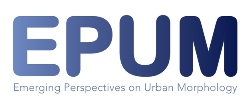Innovative perspectives on urban morphology: A relational-material approach

Innovative perspectives on urban morphology: A relational-material approach
SEMINAR – TU Wien
The first phase of the EPUM project focuses on raising awareness and bringing all partners up-to-date on best practices in each research and educational approach in relation to urban morphology. Small scale learning and teaching activities are initiated by project partners through local projects/seminars aiming at introducing students and researchers to the project’s objectives and learning resources. Within this framework, a seminar introduced during the Spring 2018 semester in TU Wien, aims to reach across disciplines and cultures with the aim of establishing productive linkages between analytical approaches to physical urban form and qualitative research practices engaging in social space.
The seminar will develop a dialectics between people’s unequal experiences of urban form and the spatial dynamics of constituting, negotiating and mobilising difference, considering systems of class, culture, gender, ethnicity and other. However, it will also reflect on the research practice as a means for curbing or fostering people’s social, cultural and political agency to transform spatial form.
The seminar will be based on locally embedded learning from/at Vienna’s urban fabric and will further elaborate a design-by-action research method, with the aim to scrutinize urban morphology at the interface between regulation of space, or lack thereof, and the struggles of diverse publics to (in)formally claim space for own needs. Participating students from Vienna’s universities and project partner universities in Cyprus, Italy, Portugal and UK, will be invited to reflect on the established routines of researching urban morphology and to devise a locally embedded approach to their field work in urban space which by definition is sensitive – being politically charged by a series of binaries, such as centrality/margin, exclusion/inclusion, boundary/opening etc. Participants will be introduced to previous endeavours of TU Wien’s students who have developed micro-scale morphologies in large housing estates in Vienna’s periphery through cooperation with local organisations (such as youth centre), while inevitably engaging with interlinked issues of regulation, provision, spatial needs and claims, innovation and informal co-creation. Participants can take inspiration or even join in to continue on developing one of such projects, exchanging experience and knowledge while designing and constructing a micro-scale morphology in support of local population’s spatial claims.
The methodological conceptual framework encompasses a broad range of inquiries into lived space, which is understood as an embodiment of a plurality of particular memories, cultures and experiences, which might be institutionalised, contested, discriminated against, marginalised or rather invisible. Lived public space is introduced as a key sphere for exploring, conceptualising and shaping the emerging patterns and materialities of urban morphology. It will build on the analysis and reflection on the situational occurrence of public space (e.g. everyday routines, protest, planning practice, design of spaces) by taking into consideration often ‘hidden’ structural processes, such as poverty, exclusion, mobility or spatial displacement. This methodology will, in particular, take on the challenge of expanding notions of urban morphology centred on rationality and visual representations by emphasising affect and bodily experiences as very parts of structural determination of urban morphology. Students and teachers will learn with and from a variety of methods, including, but not restricted to methods of ethnographic and social research, design graphic tools, incomplete mapping, participatory strategies, hands-on approaches, and experiential research methodologies.
Blended Learning
During the seminar, participants will also be introduced to approaches to urban morphology which are developed and applied by other project partners. Information about other approaches will be provided in the format of short live and online lectures and seminar readings.


